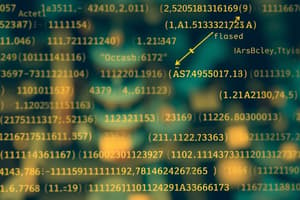Podcast
Questions and Answers
What are the three major components of an algorithm?
What are the three major components of an algorithm?
The three major components are input, processing, and output.
Define finiteness in the context of algorithms.
Define finiteness in the context of algorithms.
Finiteness means that an algorithm must terminate after a finite number of steps.
What does definiteness imply about the steps in an algorithm?
What does definiteness imply about the steps in an algorithm?
Definiteness implies that each step of the algorithm must be precise and clear.
Explain the concept of generality in algorithms.
Explain the concept of generality in algorithms.
What role do algorithms play in problem-solving?
What role do algorithms play in problem-solving?
List two properties of effective algorithms.
List two properties of effective algorithms.
How does decomposition benefit the process of solving complex problems with algorithms?
How does decomposition benefit the process of solving complex problems with algorithms?
Why is it important for algorithms to process various data types?
Why is it important for algorithms to process various data types?
What are the four main criteria to consider when selecting an algorithm?
What are the four main criteria to consider when selecting an algorithm?
Define an algorithm and its significance in problem solving.
Define an algorithm and its significance in problem solving.
What are the three major components of an algorithm?
What are the three major components of an algorithm?
How does reflection play a role in problem solving after executing a plan?
How does reflection play a role in problem solving after executing a plan?
Why might multiple algorithms exist for a single problem?
Why might multiple algorithms exist for a single problem?
What is the importance of validating the correctness of a plan in problem solving?
What is the importance of validating the correctness of a plan in problem solving?
What is the role of abstraction and decomposition in algorithms?
What is the role of abstraction and decomposition in algorithms?
How do characteristics such as reliability and accuracy impact algorithm selection?
How do characteristics such as reliability and accuracy impact algorithm selection?
What are the main selection criteria when choosing an algorithm for a problem?
What are the main selection criteria when choosing an algorithm for a problem?
Define an algorithm in your own words.
Define an algorithm in your own words.
What are the atomic nature and its importance in the context of algorithms?
What are the atomic nature and its importance in the context of algorithms?
List the three major ways of expressing an algorithm.
List the three major ways of expressing an algorithm.
Why is pseudocode considered an effective way of expressing algorithms?
Why is pseudocode considered an effective way of expressing algorithms?
What role do algorithms play in the problem-solving process?
What role do algorithms play in the problem-solving process?
Identify one disadvantage of using natural language to express algorithms.
Identify one disadvantage of using natural language to express algorithms.
What is one advantage of using flowcharts compared to pseudocode?
What is one advantage of using flowcharts compared to pseudocode?
Study Notes
Role of Algorithms in Problem Solving
- Algorithms break down complex problems into simpler, atomic tasks or subtasks, allowing for more rational decision-making supported by factual information.
- A single algorithm can be applied across various tasks, enhancing the consistency and reliability of the problem-solving process.
Ways of Expressing Algorithms
-
Natural Language:
- Utilizes everyday language but can be overly wordy and confusing.
- Example: An algorithm to calculate the area of a triangle includes steps to start, select values, calculate the product, divide by two, and stop.
-
Pseudocode:
- Closely resembles programming language syntax but lacks strict formatting rules.
- Offers clarity and detail without ambiguity, allowing for system design independent of any particular programming language.
-
Flowcharts:
- Visual representation of processes, providing a pictorial overview of the steps involved in an algorithm.
Pseudocode Advantages
- Easy to learn and understand, presenting a detailed overview of the system.
- Enables the identification of potential issues in the execution plan, allowing for corrections and improvements to be made.
General Problem Solving Strategies
- Looking Back:
- Involves reflection on the problem-solving process to verify correctness, consistency, and applicability of the solution to other problems.
Concepts of Algorithm
- Algorithms facilitate the abstraction and decomposition of large problems into manageable subtasks.
- They are defined as a sequence of instructions intended to solve a problem within a finite timeframe and with limited data.
- Multiple algorithms can exist for a single problem, with the selection dependent on factors like reliability, accuracy, ease of modification, and execution speed in a high-level language.
Major Components of Algorithms
- Every algorithm involves three key sections:
- Input: Data required for the process.
- Processing: Computations or transformations applied to the input data.
- Output: Result produced after processing the input.
Properties of Algorithms
- Finiteness: Must complete after a finite number of steps.
- Definiteness: Each step should be clear and understandable.
- Effectiveness: Should be easily convertible into programming language within a finite time.
- Generality: Should consistently produce the same output for various valid inputs.
- Input/Output Relationship: Clear connection between input values and output results.
Role of Algorithms in Problem Evaluation
- Algorithms assist in evaluating whether a problem can be effectively solved with computational methods.
- They help identify key steps, decision points, and necessary variables for developing a computer program.
- Algorithms enable the decomposition of large tasks, reducing complexity and making problems more manageable to solve.
Studying That Suits You
Use AI to generate personalized quizzes and flashcards to suit your learning preferences.
Related Documents
Description
This quiz explores the significance of algorithms in rational decision-making processes. It covers the atomic nature of tasks, the consistency of applying one algorithm to various tasks, and the different ways to express algorithms. Understand how these elements enhance reliability in problem solving.




